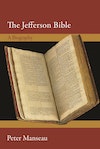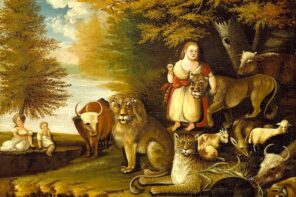In 1820, at age 77, retired President Thomas Jefferson took a razor to four versions of the Gospels—Greek, Latin, French and English—neatly excising only the texts describing Jesus’s words and earthly deeds. Any mention of miracles, or anything in the least bit supernatural, was purposefully ignored.

The Jefferson Bible: A Biography
Peter Manseau
Princeton U. Press
September 29, 2020
The resulting book became known as the Jefferson Bible. The long, strange history of the object is now the subject of a new book by Peter Manseau, The Jefferson Bible: A Biography.
Peter Manseau is the Curator of American Religious History at the Smithsonian Institution’s National Museum of American History as well as a prolific writer who has written a number of pieces for RD. Gordon Haber spoke to Manseau by phone.
This interview has been edited for length and clarity.
Tell us about the Jefferson Bible. What is it? Why did he do it?
Jefferson wanted to distill the Gospels down to core teachings of Jesus as a moral teacher. So he went through copies of the Bible and cut out with a penknife everything that had to do with Jesus’s life and teachings as opposed to the mystical and supernatural. In Jefferson’s Bible, there is no water into wine, no healing the sick, no raising Lazarus from the dead.
Jefferson thought that Paul and every other interpreter really missed the point with Jesus. He felt that the authors of the Christian tradition, for “reasons of their own roguery or stupidity,” couldn’t comprehend what Jesus was offering. So as a result they deified him.
The Jefferson Bible is a strange book to read if you’re at all familiar with the Gospels. It begins with Luke 2, with the Roman census, and ends with this stark image of the stone covering Jesus’s tomb.
Yes, it starts with taxes and ends with death. Look, the Jefferson Bible is an interesting reflection of Jefferson’s mind. But he actively tries to undo what made the Gospels interesting. Without those miraculous or supernatural elements there’s not a lot going on. You don’t get the sense of the Jesus that millions of people for centuries have talked about, gotten excited by. But Jefferson wasn’t interested in that Jesus. He wanted to peel all that away and present Jesus from a rational perspective.
In your own book, you refer to the Jefferson Bible as “all setup and no payoff.”
Well, the figure of Jesus is bizarre. You see this in Jefferson’s rendering of Matthew 12, when Jesus heals the man with the withered hand. In Jefferson’s version Jesus talks about healing and seems to have the ability to do so and doesn’t do it. It makes you wonder what people are really talking about when they claim the Jefferson Bible is important to them.
It is interesting how this book has been interpreted over the centuries.
I see the Jefferson Bible as a kind of spiritual Rorschach test. Just as with the founding fathers themselves, it’s easy to see what we want to see. Especially since Jefferson didn’t write any of this. He simply edited, and so there’s a lot of interpretation that can be done in terms of the very act of making the Jefferson Bible. He explained the reasons for making the book in his correspondence, but there’s nothing in the book itself. So every generation recasts it in its own image.
Your book takes us through the nineteenth- and twentieth-century history of the Jefferson Bible as an historical object. What’s your favorite part?
I’m drawn to Cyrus Adler. Starting in the late nineteenth century, he was a curator of the National Museum, a precursor to the Smithsonian. He had a job like I do, and he stumbled into it like I did, and he built upon the idea of religion as an important part of the American past and present. He saw the Jefferson Bible as an important American historical object. It wasn’t just something left behind by a Founding Father, it was an object with a particular resonance.
It seems so obviously an object that reinforces Jefferson’s deism, and yet some insist it is evidence of his orthodox faith.
Christian nationalists cannot accept that Jefferson’s religious ideas don’t match their own. They claim that Jefferson was crafting this Bible to evangelize to Native Americans. Decades before he made The Life and Morals of Jesus of Nazareth, Jefferson made a previous version, The Philosophy of Jesus of Nazareth. The subtitle says that it was “for the use of the Indians” but there’s nothing anywhere else to support that intention.
Here’s the full title of the earlier book: The Philosophy of Jesus of Nazareth: extracted from the account of his life and doctrines as given by Matthew, Mark, Luke, & John. Being an abridgement of the New Testament for the use of the Indians unembarrassed with matters of fact or faith beyond the level of their comprehensions.
It’s possible Jefferson’s mention of “the Indians” was a jab at the Federalists who questioned his devotion to Christianity. Still I get correspondence at the Smithsonian asking me why we don’t tell the story of why Jefferson made it to evangelize to Native Americans.
How do you counter these myths?
You tell and tell again the complicated story—including some version of what the agenda-driven want you to tell. The 1804 subtitle had an allusion to Indian populations. But the scholarship suggests that Jefferson meant political rivals who had the understanding of “uneducated savages.” The full complicated story includes that.
The point I want to make with my own book is that the story of the Jefferson Bible is as much about the twentieth and twenty-first century as it is about the eighteenth and nineteenth. This Jefferson Bible is something Americans have used to make sense of our founding and make sense of ourselves. It’s so complicated and interesting and challenging.
Jefferson himself was interesting and challenging. Your book reminded me that Jefferson was one of those great Enlightenment polymaths.
He saw himself as equipped to do anything, any challenge, whether it was archaeology or politics or editing the Gospels.
Except freeing the slaves. He wasn’t up for that challenge.
That’s something I realized only later, that he is excused as a man of his time when we talk of the ownership and enslavement of men, women, and children. And yet he thought of himself as ahead of his time. He was in fact imprisoned by his own time.





